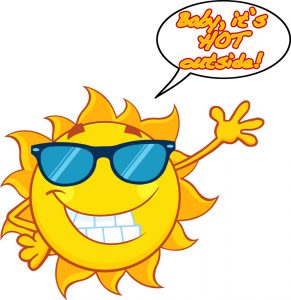 With weekend temperatures in Chester County expected to soar to near 100 degrees, experts — and the state — are warning the high heat and humidity could be dangerous for some area residents.
With weekend temperatures in Chester County expected to soar to near 100 degrees, experts — and the state — are warning the high heat and humidity could be dangerous for some area residents.
The National Weather Service is calling for temperatures in the mid to high 90s, today, Saturday and Sunday, before the heat breaks late Sunday. Saturday could approach 100 degrees with humidity. The NWS has issued an Excessive Heat Warning through Sunday at 10 p.m.
A line of thundershower is expected to pass through the county Sunday night and bring with it cooler temperatures into the early week, before rebounding to normal seasonal highs — the mid to upper 80s — by week’s end.
Until the heat breaks, though, state officials are cautioning Chester County residents to be aware of the heat, take precautions and take extra care for those who might be the most vulnerable.
“Weekend routines change our travel and our outdoor activities, and we need to take these heat warnings very seriously,” Gov. Tom Wolf said in a statement, Friday. “It’s critically important that Pennsylvanians pay attention to weather reports, heat warnings, and what the experts are telling us about heat safety.”
The Wolf Administration is urging all Pennsylvanians to take steps to keep themselves and their loved ones, including pets, safe from potentially deadly heat-related illnesses. Infants and children, older adults, and people suffering from illness may be less able to respond to extreme temperatures and taking certain medications can affect how one’s body responds to heat.
All Pennsylvanians are urged to follow these safety tips to avoid heat-related illnesses:
- Drink plenty of water and do not wait until you are thirsty to drink more fluids;
- Avoid drinks with caffeine, alcohol, or large amounts of sugar, as they can cause dehydration (loss of body fluids);
- Stay indoors in air conditioning as much as possible – this is the best way to protect against heat-related illness and death;
- Avoid long periods in the direct sun or in unventilated rooms;
- If you must be outside in the heat, reschedule activities for cooler times of the day, and try to rest often in shady areas;
- Dress in light-colored, loose-fitting clothing, a wide-brimmed hat, and sunglasses – and use a sunscreen of SPF15 or higher;
- Take frequent baths or showers and remain in a cool place;
- Check on those who might be more at risk from high temperatures like infants, children, or older individuals; and
- Never leave your children or pets inside vehicles.
Pennsylvania’s network of Area Agencies on Aging is a great resource for seniors or their caregivers to find senior centers acting as cooling centers if needed and Ready.pa.govand health.pa.gov offer tips on staying safe and comfortable during this heat wave.
“Extreme heat poses a danger to all Pennsylvanians, and we urge everyone to be aware of the potential for heat-related illnesses,” Secretary of Health Dr. Rachel Levine said. “Heat stroke and heat exhaustion are both serious, and potentially life-threatening illnesses that can occur very quickly when high temperatures occur.”
The Pennsylvania Public Utility Commission provided a “Summer Heat Wave” fact sheet to provide tips on conserving energy and ensuring a cool, comfortable dwelling:
- Turn off non-essential appliances and as many lights as possible.
- Postpone using appliances that produce heat, such as clothes dryers, dishwashers and stoves until after 7 p.m. These appliances also use significant amounts of electricity adding to the demand on an electric infrastructure that is already stressed during peak hours due to heat.
- Use ceiling fans to circulate the air, keeping rooms and you cooler.
- Close curtains or window blinds to block sunlight and heat or relax in rooms that do not receive direct sunlight.
- If you have window air conditioning units, close off rooms not in use.
- Make sure all air conditioner filters are clean and in good shape.
- Replace filters monthly for maximum benefit and check air and return vents on a regular basis to keep circulation air paths clear.
- On hot and humid days, set your thermostat at 78 degrees when you are home and 85 degrees or off when you are away for long periods.
The PUC also notes that the regional power grid operator is working with utilities and power generators across the region to ensure that there are enough resources to meet demand – and the PUC is closely monitoring that. Demand is expected to peak today, but that peak is expected to be well below the available capacity.
For those who are working, employers should have a heat-illness prevention program in place that ensures workers receive plenty of water often and take frequent rest and shade breaks, trains workers to recognize symptoms of heat-related health effects, and monitors workers for signs of illness. The Department of Labor & Industry has various heat-related workplace safety resources available for employers, including a training webinar and PowerPoint, that provide guidance on working safely in higher temperatures.
The most common heat-related illnesses are heat stroke and heat exhaustion. Heat stroke is the most serious heat-related illness. Warning signs include extreme body temperature, rapid pulse, throbbing headache, dizziness and confusion. If you or loved ones develop heat stroke symptoms, get medical assistance right away. Heat exhaustion symptoms include heavy sweating, paleness, muscle cramps, tiredness, weakness, dizziness, headache, nausea or vomiting, and fainting.
Livestock and pet owners should take appropriate precautions to protect their animals from high temperatures that can cause them to suffer from heat-related stress and illness. Provide shade and water, postpone procedures such as vaccines or hoof trimming until weather is cooler, avoid unnecessary transportation, never leave pets in a hot car, and take pets for walks in early morning or late hours.
The Pennsylvania Emergency Management Agency is working closely with county emergency management officials in the event that state resources are needed to support efforts to keep people safe. Many counties will post information on their websites or social media accounts as cooling centers open and close. Anyone who needs specifics can call their county emergency management agency, keeping in mind that a closer location may be in a neighboring county rather than the one where they reside.
“PEMA has had our area offices reach out to counties that are under an excessive heat watch or warning to assess whether they’ve implemented their excessive heat plans and whether they have any resource gaps or unmet needs,” Randy Padfield, PEMA director said. “Philadelphia has executed a public health emergency for the heat emergency and is taking actions following their established plan. No other counties are reporting any issues at this point. No other counties have issued disaster declarations, nor are they anticipating doing so at this point, but will remain in close contact and provide updates as necessary.”
PEMA has also been in contact with all state agencies to discuss the situation and assess their preparation for the heat. Those agencies include Aging, Human Services, Health, PUC, Pennsylvania State Police and PennDOT.
“All agencies report that they are prepared,” Padfield said. “PEMA will remain in close contact and is also ready to respond as needed throughout the commonwealth.”
For more information, visit Ready.PA.gov or health.pa.gov
To contact your local Area Agency on Aging, click here.
The American Red Cross is offering similar advice:
NEVER LEAVE CHILDREN OR PETS IN YOUR VEHICLE. The inside temperature of the car can quickly reach 120 degrees. Other heat safety steps include:
- Stay hydrated, drink plenty of fluids. Avoid drinks with caffeine or alcohol.
- Avoid extreme temperature changes.
- Wear loose-fitting, lightweight, light-colored clothing. Avoid dark colors as they absorb the sun’s rays.
- Slow down, stay indoors. Avoid strenuous exercise during the hottest part of the day.
- Postpone outdoor games and activities.
- Use a buddy system when working in excessive heat. Take frequent breaks if working outdoors.
- Check on family, friends and neighbors who do not have air conditioning, who spend much of their time alone or who are more likely to be affected by the heat.
- If you don’t have air conditioning, go to public spaces for relief from the heat during the warmest part of the day.
HEAT EXHAUSTION Excessive heat can lead to sunburn, heat cramps, heat exhaustion and heat stroke. If someone is experiencing heat cramps in the legs or abdomen, get them to a cooler place, have them rest, lightly stretch the affected muscle, and replenish their fluids with a half a glass (about 4 ounces) of cool water every 15 minutes.
If someone is exhibiting signs of heat exhaustion (cool, moist, pale or flushed skin, heavy sweating, headache, nausea, dizziness, weakness exhaustion), move them to a cooler place, remove or loosen tight clothing and spray the person with water or apply cool, wet cloths or towels to the skin. Fan the person. If they are conscious, give small amounts of cool water to drink. Make sure the person drinks slowly. Watch for changes in condition. If the person refuses water, vomits or begins to lose consciousness, call 9-1-1.
HEAT STROKE IS LIFE-THREATENING. Signs include hot, red skin which may be dry or moist; changes in consciousness; vomiting and high body temperature. Call 9-1-1 immediately if someone shows signs of heat stroke. Move the person to a cooler place. Quickly cool the person’s body by immersing them up to their neck in cold water if possible. Otherwise, douse or spray the person with cold water, or cover the person with cold, wet towels or bags of ice.
DON’T FORGET YOUR PETS Check on animals frequently to ensure that they are not suffering from the heat. Make sure they have plenty of shade and cool water.
- Animals can suffer heat stroke, a common problem for pets in the warmer weather. Some of the signs of heat stroke in your pet are:
- Heavy panting and unable to calm down, even when lying down.
- Brick red gum color
- Fast pulse rate
- Unable to get up.
- If you suspect your pet has heat stroke, take their temperature rectally.
- If the temperature is above 105 degrees, cool the animal down. The easiest way to do this is by using the water hose. Stop cooling the animal when the temperature reaches 103 degrees.
- Bring your pet to a veterinarian as soon as possible as heat stroke can lead to severe organ dysfunction and damage.






